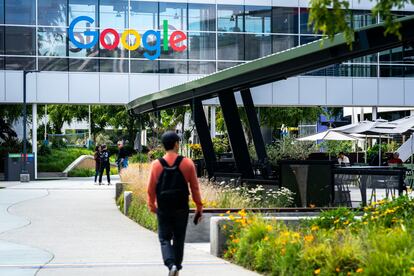Why there are companies that do better in crises than in normal times
Technology, energy and financial corporations have become the elite within the elite

During crises, there are always people, companies and sectors that fare better than they do in normal times. That is especially true when crises are caused by a host of different problems, as is the case now. Many of those people are the ones who publicly and repeatedly declare that crises represent opportunities, while everyone else suffers in silence. The composition of today’s society has changed from what it was just a decade or 15 years ago. The prominence of the leaders of technology, energy and commodity companies, and the world of finance, which surrounds them like a protective cloak, is one case in point. They are not the 1%, as the American anthropologist David Graeber wrote in Occupy Wall Street, but rather 0.01%: they are the elite of the elite, and wealth has become even more concentrated.
The highest echelon of society is transformed when a new geopolitical opportunity arises. In this case, the pandemic and the ongoing war in Ukraine have occurred over a period of time long enough to allow for these changes to take place. When we review what has happened in the world’s leading countries, the profits of the aforementioned sectors are eating into others’ profits. But above all, they are eating into wages. The slices of the economic pie are increasingly unequal. Paul Krugman has attributed this phenomenon to two new factors in addition to the ones that always occur at the bottom of the business cycle (“creative destruction,” union weakness, etc.): high technology has accelerated and put less dynamic sectors and labor at a disadvantage. But most important are the effects of rising oligopolization, the process in which incumbent companies quickly gobble up emerging ones to avoid competition, which means that they can increasingly monopolize political power (to stifle tax reform and attempts at regulation, and even to condition how people think). As US President Joe Biden recently declared, “Capitalism without competition is not capitalism but exploitation”.
Of the 10 most profitable corporations, there are three technology companies (Apple, Microsoft, Alphabet), five energy companies (Exxon, Shell, Total, Chevron, AP Moller-Maersk), one pharmaceutical company (Pfizer) and one large bank, JPMorgan. In reality, banking—whether commercial, investment or shadow banking—finances all other activities through products such as derivatives, futures and so on, so that in many cases it makes no difference whether the price of what they offer goes up or down: they always make more money. Argentine author Hernán Díaz describes this all-encompassing image of finance in his novel Trust, when one of the characters fantasizes: “Every financier ought to be a polymath, because finance is the thread that runs through every aspect of life. It is indeed the knot where all the disparate strands of human existence come together. Business is the common denominator of all activities and enterprises. This, in turn, means that there is no affair that does not pertain to the businessman. To him everything is relevant. He is the true Renaissance man.” Not even Rafael Termes, the enlightened Spanish banker and president of that industry’s employers’ association, who represented the best of economic liberalism (the market is always right; those who try to control it are never right) could have put it better, as long as this liberalism stopped at the gates of the financial sector.
On the one hand, wealth distribution has improved the situation of society’s leading corporations, for which 2022 has been a memorable year in terms of profits; on the other hand, it has exacerbated everyone else’s problems: enormous debt, inequalities, the climate emergency, the growing financial vulnerability of small- and medium-sized banks, the insecurity that globalization has created, and an unregulated artificial intelligence that threatens the depth of democracies. That is the system.
Sign up for our weekly newsletter to get more English-language news coverage from EL PAÍS USA Edition
Tu suscripción se está usando en otro dispositivo
¿Quieres añadir otro usuario a tu suscripción?
Si continúas leyendo en este dispositivo, no se podrá leer en el otro.
FlechaTu suscripción se está usando en otro dispositivo y solo puedes acceder a EL PAÍS desde un dispositivo a la vez.
Si quieres compartir tu cuenta, cambia tu suscripción a la modalidad Premium, así podrás añadir otro usuario. Cada uno accederá con su propia cuenta de email, lo que os permitirá personalizar vuestra experiencia en EL PAÍS.
¿Tienes una suscripción de empresa? Accede aquí para contratar más cuentas.
En el caso de no saber quién está usando tu cuenta, te recomendamos cambiar tu contraseña aquí.
Si decides continuar compartiendo tu cuenta, este mensaje se mostrará en tu dispositivo y en el de la otra persona que está usando tu cuenta de forma indefinida, afectando a tu experiencia de lectura. Puedes consultar aquí los términos y condiciones de la suscripción digital.









































